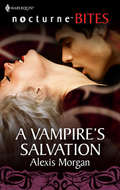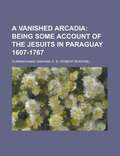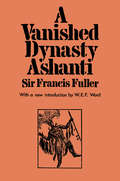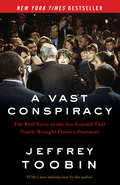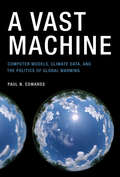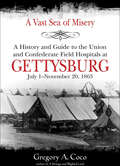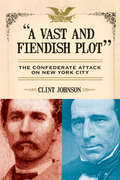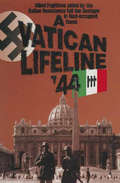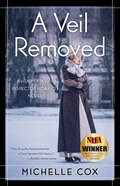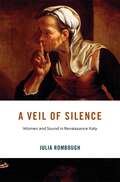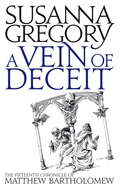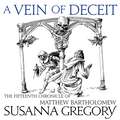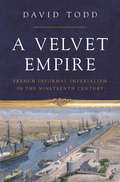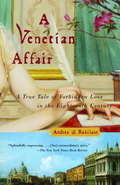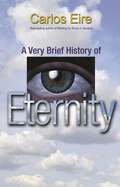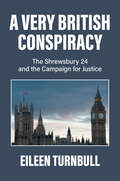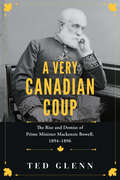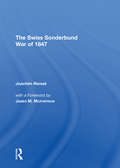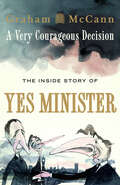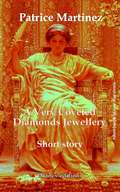- Table View
- List View
A Valley Wedding: Book 3 in the uplifting new Backshaw Moss series (Backshaw Moss)
by Anna JacobsThe third novel in the brand new Backshaw Moss series by beloved million-copy bestselling author Anna JacobsLancashire, 1936. With her son Gabriel finally married, and her youngest following his dreams of becoming a doctor, Gwynneth Harte finds herself with an empty nest - until a fire forces her to move in with Gabriel and his wife Maisie at their home on Daisy Street. Arthur Chapman has been at a low ebb ever since the death of his wife. Turning to drink in his grief, he lost both his job and contact with his grandchild, Beatie - but now the inheritance of a house from a distant relative is the fresh start he needs. When Beatie runs away from her cruel grandmother and takes refuge with Gwynneth, she and Arthur are thrown together - and find themselves growing closer. But trouble is brewing in the valley, from the ambitions of the bullying local landlord to rumours of a Fascist spy. Can the residents of Backshaw Moss band together to keep each other safe, and will there be wedding bells on Daisy Street?Readers love Anna Jacobs' Birch End Series!'Amazing' - 5 STARS'Thank you, Anna, for the pleasure you give in all your books' - 5 STARS'Another brilliant, hard-to-put-down book' - 5 STARS'Can't wait for the next instalment' - 5 STARS'A real page turner, I can't wait to read the next one' - 5 STARS'Another triumph for Anna Jacobs' - 5 STARS'BRILLIANT READ' - 5 STARS
A Valley Wedding: Book 3 in the uplifting new Backshaw Moss series (Backshaw Moss)
by Anna JacobsThe third novel in the brand new Backshaw Moss series by beloved million-copy bestselling author Anna JacobsLancashire, 1936. With her son Gabriel finally married, and her youngest following his dreams of becoming a doctor, Gwynneth Harte finds herself with an empty nest - until a fire forces her to move in with Gabriel and his wife Maisie at their home on Daisy Street. Arthur Chapman has been at a low ebb ever since the death of his wife. Turning to drink in his grief, he lost both his job and contact with his grandchild, Beatie - but now the inheritance of a house from a distant relative is the fresh start he needs. When Beatie runs away from her cruel grandmother and takes refuge with Gwynneth, she and Arthur are thrown together - and find themselves growing closer. But trouble is brewing in the valley, from the ambitions of the bullying local landlord to rumours of a Fascist spy. Can the residents of Backshaw Moss band together to keep each other safe, and will there be wedding bells on Daisy Street?(P) 2022 Hodder & Stoughton Limited
A Vampire's Salvation
by Alexis MorganLife imprisonment has a whole new meaning when you live for centuries. . . It's been fifteen long years since vampire Cord Kilpatrick was sent to prison for his business partner's disappearance. Chancellor Olivia McCabe is the only investigator who doesn't think he's guilty. . . and she's the one woman he can't stop thinking about. When Olivia gets the chance to prove his innocence and has him released into her personal custody, Cord is tempted by the beautiful vampiress more than ever. Can he hope to find salvation from his past and the passion he's longed for in Olivia's arms?
A Vanished Arcadia: Being Some Account of the Jesuits in Paraguay 1607-1767
by R. B. Cunninghame GrahamN/A
A Vanished Dynasty - Ashanti
by Sir Francis FullerFirst published in 1921, this is a record of a dynasty which arose in Ashanti in 1695, lasting until 1895, when it fell under the extension of British rule.
A Vanished World: Medieval Spain's Golden Age of Enlightenment
by Christopher LowneyIn a world troubled by religious strife and division, Chris Lowney's vividly written book offers a hopeful historical reminder: Muslims, Christians, and Jews once lived together in Spain, creating a centuries-long flowering of commerce, culture, art, and architecture. In 711, a ragtag army of Muslim North Africans conquered Christian Spain and launched Western Europe's first Islamic state. In 1492, Ferdinand and Isabella vanquished Spain's last Muslim kingdom, forced Jews to convert or emigrate, and dispatched Christopher Columbus to the New World. In the years between, Spain's Muslims, Christians, and Jews forged a golden age for each faith and distanced Spain from a Europe mired in the Dark Ages. Medieval Spain's pioneering innovations touched every dimension of Western life: Spaniards introduced Europeans to paper manufacture and to the Hindu-Arabic numerals that supplanted the Roman numeral system. Spain's farmers adopted irrigation technology from the Near East to nurture Europe's first crops of citrus and cotton. Spain's religious scholars authored works that still profoundly influence their respective faiths, from the masterpiece of the Jewish kabbalah to the meditations of Sufism's "greatest master" to the eloquent arguments of Maimonides that humans can successfully marry religious faith and reasoned philosophical inquiry. No less astonishing than medieval Spain's wide-ranging accomplishments was the simple fact its Muslims, Christians, and Jews often managed to live and work side by side, bestowing tolerance and freedom of worship on the religious minorities in their midst. A Vanished World chronicles this impossibly panoramic sweep of human history and achievement, encompassing both the agony of jihad, Crusades, and Inquisition, and the glory of a multicultural civilization that forever changed the West. One gnarled root of today's religious animosities stretches back to medieval Spain, but so does a more nourishing root of much modern religious wisdom.
A Vast Conspiracy: The Real Story of the Sex Scandal That Nearly Brought Down a President
by Jeffrey ToobinAccount of the Clinton scandals.
A Vast Machine: Computer Models, Climate Data, and the Politics of Global Warming (Infrastructures)
by Paul N. EdwardsThe science behind global warming, and its history: how scientists learned to understand the atmosphere, to measure it, to trace its past, and to model its future.Global warming skeptics often fall back on the argument that the scientific case for global warming is all model predictions, nothing but simulation; they warn us that we need to wait for real data, “sound science.” In A Vast Machine Paul Edwards has news for these skeptics: without models, there are no data. Today, no collection of signals or observations—even from satellites, which can “see” the whole planet with a single instrument—becomes global in time and space without passing through a series of data models. Everything we know about the world's climate we know through models. Edwards offers an engaging and innovative history of how scientists learned to understand the atmosphere—to measure it, trace its past, and model its future.
A Vast Sea of Misery: A History and Guide to the Union and Confederate Field Hospitals at Gettysburg, July 1–November 20, 1863
by Gregory Coco“An extremely detailed history of 160 hospital sites that formed to care for soldiers who were wounded at the Battle of Gettysburg.” —Civil War CyclingNearly 26,000 men were wounded in the three-day battle of Gettysburg (July 1-3, 1863). It didn’t matter if the soldier wore blue or gray or was an officer or enlisted man, for bullets, shell fragments, bayonets, and swords made no class or sectional distinction. Almost 21,000 of the wounded were left behind by the two armies in and around the small town of 2,400 civilians. Most ended up being treated in makeshift medical facilities overwhelmed by the flood of injured. Many of these and their valiant efforts are covered in Greg Coco’s A Vast Sea of Misery.The battle to save the wounded was nearly as terrible as the battle that placed them in such a perilous position. Once the fighting ended, the maimed and suffering warriors could be found in churches, public buildings, private homes, farmhouses, barns, and outbuildings. Thousands more, unreachable or unable to be moved remained in the open, subject to the uncertain whims of the July elements. As one surgeon unhappily recalled, “No written nor expressed language could ever picture the field of Gettysburg! Blood! blood! And tattered flesh! Shattered bones and mangled forms almost without the semblance of human beings!”Based upon years of firsthand research, Coco’s A Vast Sea of Misery introduces readers to 160 of those frightful places called field hospitals. It is a sad journey you will never forget, and you won’t feel quite the same about Gettysburg once you finish reading.
A Vast and Fiendish Plot: The Confederate Attack on New York City
by Clint JohnsonNew York City, November 25, 1864. Confederate officers attempt to destroy the city with a series of lethal fires that will forever diminish it to a mere speck of an island. What fueled these Southern patriots' rage? And what if they had succeeded?This terrifying scenario almost became a reality following what the New York Herald declared "a vast and fiendish plot." Infuriated by the Union's killing of their beloved General John Hunt Morgan and the burning of the Shenandoah Valley, eight Confederate officers swore revenge. Their method: Greek fire. Their target: Manhattan's commercial district. The daring mission could have changed the course of American history. In the first book to bring to life this bold conspiracy in full detail, Civil War expert Clint Johnson reveals shocking facts about the treacherous alliances and rivalries that threatened nineteenth-century America. Here is the truth about this stunning event, the spirit that fueled it, and the near destruction of the world's most influential city. "A fresh and intriguing addition to Civil War literature. . .. Johnson dispels myths and shows how Southerners sought to take revenge on a 'sister city' they felt betrayed them."--Brion McClanahan, author of The Politically Incorrect Guide to the Founding Fathers"Insightful analysis of an amazing turn of events that nearly set New York City ablaze during the Civil War." -- David J. Eicher, author of The Longest Night
A Vatican Lifeline '44: Allied Fugitives aided by the Italian Resistance foil the Gestapo in Nazi-occupied Rome
by William SimpsonA memoir of an Allied soldier and former POW in Rome, and the unexpected support he received from the Italian people—and from a heroic Catholic monsignor. It is a widely held belief that the Italians in the Second World War failed to win much in the way of martial glory. But the scoffers tend to overlook the fact that most Italians had little or no feeling of animosity toward the Allies—and to wage war against an enemy with whom you have no quarrel is a contradiction in terms. This contradiction is vividly portrayed in William Simpson&’s dramatic account of his time in Rome after the downfall of Mussolini and Italy&’s withdrawal from the war in September 1943, when thousands of Allied prisoners of war, let loose in surrendered Italy, fell prey to occupying Nazi forces. Simpson, an escaped POW, managed, after some hair-raising adventures, to find his way to Rome and soon discovered how widespread was the support of the Italians for the Allies, and how deep-seated their hatred of the Nazis. His adventures during the months before the Allies finally liberated Rome, helping to house and feed hundreds of Allied prisoners on the run, make for compulsive reading—and leave no doubt about the extraordinary bravery of the many Italians who came to their aid. But the real hero of this dramatic story is Monsignor O&’Flaherty, who, with remarkable sangfroid, used the somewhat precarious neutrality of the Vatican, where he was employed, to help Simpson and his fellow fugitives.
A Veil Removed: A Henrietta and Inspector Howard Novel (A Henrietta and Inspector Howard Novel)
by Michelle Cox“Mixing Romance and Mystery in a Fizzy 1930s Cocktail!”“This is a wonderfully-written, engaging story with excellent character treatment and a thrilling mystery.” — IBPA, Independent Book Publishers Association“Another triumph in a gorgeously romantic, but also seriously compelling mystery series.” — Readers Favorite“Entertaining. . . Composed of large dollops of romance and a soupcon of mystery, this confection will appeal.” — Publishers WeeklyMurder is never far from this sexy couple . . . even during the holidays!Their honeymoon abruptly ended by the untimely death of Alcott Howard, Clive and Henrietta return to Highbury, where Clive discovers all is not as it should be. Increasingly convinced that his father’s death was not an accident, Clive launches his own investigation, despite his mother’s belief that he has become “mentally disturbed” with grief. Henrietta eventually joins forces with Clive on their first real case, which becomes darker—and deadlier—than they imagined as they get closer to the truth behind Alcott’s troubled affairs.Meanwhile, Henrietta’s sister, Elsie, begins, at Henrietta’s orchestration, to take classes at a women’s college—an attempt to evade her troubles and prevent any further romantic temptations. When she meets a bookish German custodian at the school, however, he challenges her to think for herself . . . even as she discovers some shocking secrets about his past life.
A Veil of Silence: Women and Sound in Renaissance Italy (I Tatti Studies in Italian Renaissance History #33)
by Julia RomboughAn illuminating study of early modern efforts to regulate sound in women’s residential institutions, and how the noises of city life—both within and beyond their walls—defied such regulation.Amid the Catholic reforms of the sixteenth and seventeenth centuries, the number of women and girls housed in nunneries, reformatories, and charity homes grew rapidly throughout the city of Florence. Julia Rombough follows the efforts of legal, medical, and ecclesiastical authorities to govern enclosed women, and uncovers the experiences of the women themselves as they negotiated strict sensory regulations. At a moment when quiet was deeply entangled with ideals of feminine purity, bodily health, and spiritual discipline, those in power worked constantly to silence their charges and protect them from the urban din beyond institutional walls.Yet the sounds of a raucous metropolis found their way inside. The noise of merchants hawking their wares, sex workers laboring and socializing with clients, youth playing games, and coaches rumbling through the streets could not be contained. Moreover, enclosed women themselves contributed to the urban soundscape. While some embraced the pursuit of silence and lodged regular complaints about noise, others broke the rules by laughing, shouting, singing, and conversing. Rombough argues that ongoing tensions between legal regimes of silence and the inevitable racket of everyday interactions made women’s institutions a flashpoint in larger debates about gender, class, health, and the regulation of urban life in late Renaissance Italy.Attuned to the vibrant sounds of life behind walls of stone and sanction, A Veil of Silence illuminates a revealing history of early modern debates over the power of the senses.
A Vein Of Deceit: The Fifteenth Chronicle of Matthew Bartholomew (Chronicles of Matthew Bartholomew #15)
by Susanna GregoryThe fifteenth chronicle in the Matthew Bartholomew series.There is something very amiss in the finances of Michaelhouse. Despite a new influx of well-heeled students, there is an acute lack of funds for the upkeep of the buildings, even for decent provisions. It is only when the Brother in charge of the account books dies unexpectedly that some sort of explanation is revealed: he has been paying large amounts of money for goods the college itself has never received. Although shocked by this evidence of fraud, Matthew is more concerned with the disappearance from his herbarium of a quantity of pennyroyal, a preparation known to cause a woman to miscarry, and a pregnant visitor to his sister's household has died from an overdose of pennyroyal. Had she meant to abort her child or had someone else wanted to ensure she was unable to provide an heir to her husband's wealthy estates? When Matthew learns that it was her husband who had received Michaelhouse's money for undelivered goods he begins to search for other connections and exposes a very treacherous vein of deceit.'A first-rate treat for mystery lovers' (Historical Novels Review)'Susanna Gregory has an extraordinary ability to conjure up a strong sense of time and place' (Choice)
A Vein Of Deceit: The Fifteenth Chronicle of Matthew Bartholomew (Chronicles of Matthew Bartholomew #15)
by Susanna GregoryThe fifteenth chronicle in the Matthew Bartholomew series.There is something very amiss in the finances of Michaelhouse. Despite a new influx of well-heeled students, there is an acute lack of funds for the upkeep of the buildings, even for decent provisions. It is only when the Brother in charge of the account books dies unexpectedly that some sort of explanation is revealed: he has been paying large amounts of money for goods the college itself has never received. Although shocked by this evidence of fraud, Matthew is more concerned with the disappearance from his herbarium of a quantity of pennyroyal, a preparation known to cause a woman to miscarry, and a pregnant visitor to his sister's household has died from an overdose of pennyroyal. Had she meant to abort her child or had someone else wanted to ensure she was unable to provide an heir to her husband's wealthy estates? When Matthew learns that it was her husband who had received Michaelhouse's money for undelivered goods he begins to search for other connections and exposes a very treacherous vein of deceit.'A first-rate treat for mystery lovers' (Historical Novels Review)'Susanna Gregory has an extraordinary ability to conjure up a strong sense of time and place' (Choice)
A Velvet Empire: French Informal Imperialism in the Nineteenth Century (Histories of Economic Life #29)
by David ToddHow France's elites used soft power to pursue their imperial ambitions in the nineteenth centuryAfter Napoleon's downfall in 1815, France embraced a mostly informal style of empire, one that emphasized economic and cultural influence rather than military conquest. A Velvet Empire is a global history of French imperialism in the nineteenth century, providing new insights into the mechanisms of imperial collaboration that extended France's power from the Middle East to Latin America and ushered in the modern age of globalization.David Todd shows how French elites pursued a cunning strategy of imperial expansion in which conspicuous commodities such as champagne and silk textiles, together with loans to client states, contributed to a global campaign of seduction. French imperialism was no less brutal than that of the British. But while Britain widened its imperial reach through settler colonialism and the acquisition of far-flung territories, France built a "velvet" empire backed by frequent military interventions and a broadening extraterritorial jurisdiction. Todd demonstrates how France drew vast benefits from these asymmetric, imperial-like relations until a succession of setbacks around the world brought about their unravelling in the 1870s.A Velvet Empire sheds light on France's neglected contribution to the conservative reinvention of modernity and offers a new interpretation of the resurgence of French colonialism on a global scale after 1880. This panoramic book also highlights the crucial role of collaboration among European empires during this period—including archrivals Britain and France—and cooperation with indigenous elites in facilitating imperial expansion and the globalization of capitalism.
A Venetian Affair
by Andrea Di RobilantIn the waning days of Venice’s glory in the mid-1700s, Andrea Memmo was scion to one the city’s oldest patrician families. At the age of twenty-four he fell passionately in love with sixteen-year-old Giustiniana Wynne, the beautiful, illegitimate daughter of a Venetian mother and British father. Because of their dramatically different positions in society, they could not marry. And Giustiniana’s mother, afraid that an affair would ruin her daughter’s chances to form a more suitable union, forbade them to see each other. Her prohibition only fueled their desire and so began their torrid, secret seven-year-affair, enlisting the aid of a few intimates and servants (willing to risk their own positions) to shuttle love letters back and forth and to help facilitate their clandestine meetings. Eventually, Giustiniana found herself pregnant and she turned for help to the infamous Casanova–himself infatuated with her. Two and half centuries later, the unbelievable story of this star-crossed couple is told in a breathtaking narrative, re-created in part from the passionate, clandestine letters Andrea and Giustiniana wrote to each other.
A Venetian Bestiary
by Jan MorrisInspired by the many images of animals and birds in the city of Venice, the author describes the history and mythology of the beautiful Italian city.
A Very Brief History of Eternity
by Carlos EireFrom the author of Waiting for Snow in Havana, a brilliant cultural history of the idea of eternityWhat is eternity? Is it anything other than a purely abstract concept, totally unrelated to our lives? A mere hope? A frightfully uncertain horizon? Or is it a certainty, shared by priest and scientist alike, and an essential element in all human relations?In A Very Brief History of Eternity, Carlos Eire, the historian and National Book Award–winning author of Waiting for Snow in Havana, has written a brilliant history of eternity in Western culture. Tracing the idea from ancient times to the present, Eire examines the rise and fall of five different conceptions of eternity, exploring how they developed and how they have helped shape individual and collective self-understanding.A book about lived beliefs and their relationship to social and political realities, A Very Brief History of Eternity is also about unbelief, and the tangled and often rancorous relation between faith and reason. Its subject is the largest subject of all, one that has taxed minds great and small for centuries, and will forever be of human interest, intellectually, spiritually, and viscerally.
A Very British Conspiracy: The Shrewsbury 24 and the Campaign for Justice
by Eileen TurnbullThe story of the campaign for justice for the 24 building workers wrongly prosecuted by the state in the 1970sWhen a group of North Wales building workers were put on trial for picketing-related offences during the first and only national building workers strike in Britain, it not only had a profound and lifelong impact upon them and their families. It also was a turning point for halting the growth of trade unionism in the building industry, from which it has never recovered.Using newly available material that Eileen Turnbull discovered in various archives whilst searching for the fresh evidence that would get the pickets convictions referred to the Court of Appeal, A British Conspiracy uncovers government and police documents that show the careful planning of the prosecution of the North Wales building workers. It brings into focus the secrecy surrounding the actions of the police and the government in the five months between the end of the strike in September 1972 and the arrest of the pickets on the 14 February 1973. It shows how the state used the criminal justice system to halt effective picketing by workers during industrial disputes. It reveals that common law offences were carefully selected to overcome the prosecutions&’ problems of a lack of hard evidence.The premature death of one of the convicted pickets was a catalyst for a group of trade unionists in the North West to come together in 2006 to organise a campaign. In February 2021, their appeal against the convictions was finally successful. The book describes, through their own words, how the pickets and their families felt after forty-seven years being ostracised and considered as criminals in their communities, as well as the response of the six core Campaign Committee members who had brought this historic victory about.
A Very British Ending (William Catesby #5)
by Edward WilsonAn MI6 officer, haunted by the ghosts of an SS atrocity, kills a Nazi war criminal in the ruins of a U-boot bunker. The German turns out to be a CIA asset being rat-lined to South America.As a hungry Britain freezes in the winter of 1947, a young cabinet minister negotiates a deal with Moscow trading Rolls-Royce jet engines for cattle fodder and wood. Both have made powerful enemies with long memories. The fates of the two men become entwined as one rises through MI6 and the other to Downing Street. It is the mid-1970s and a coup d'etat is imminent.A Very British Ending is the Wolf Hall of power games in modern Britain. Senior MI6 officers, Catesby and Bone, try to outwit a cabal of plotters trying to overthrow the Prime Minister. The author once again reveals the dark underside of the Secret State on both sides of the Atlantic.
A Very Canadian Coup: The Rise and Demise of Prime Minister Mackenzie Bowell, 1894–1896
by Ted GlennA fresh take on the Manitoba schools question and the Conservative Coup that toppled Canada’s fifth prime minister.When Mackenzie Bowell became Canada’s fifth prime minister in December 1894, everyone — including Bowell — expected the job would involve nothing more than keeping the wheels on the Conservative wagon until a spring election.Plans for a quiet caretakership were dashed in January 1895 when the courts ruled that the Manitoba government had violated Roman Catholics’ constitutional rights by abolishing the provincial separate school system. Catholics in Quebec demanded that Bowell force Manitoba to restore the schools, while Ontario Protestants warned him to keep his hands off.Backed into a corner, Bowell tried three times to negotiate a compromise with the Manitoba government over the course of 1895, but to no avail. By January 1896, seven of Bowell’s cabinet ministers had had enough. Convinced that Bowell had tarnished the Conservative brand, the caballers forced the prime minister to resign and make way for a new leader, who they believed could revive party fortunes in time for the coming election—the old Warhorse of Cumberland, Sir Charles Tupper. Ultimately, the coup didn’t matter. Tupper and his conspirators pleaded their case in Parliament and on the hustings, but nothing could stand in the way of Wilfrid Laurier and his Liberals’ historic rise to power in the June 1896 election.A Very Canadian Coup brings fresh sources and new perspectives to bear on the life and times of Canada’s fifth prime minister and his Sixth Ministry.
A Very Civil War: The Swiss Sonderbund War Of 1847
by Joachim RemakA Very Civil War is the first complete account of the important but much neglected story of Switzerlands civil war of 1847. Fought over issues similar to those of the American Civil War, the comparative civility of the Swiss warthere were fewer than one hundred casualtiesis remarkable. Indeed, a war that might have destroyed Swiss union instead contributed to a sense of cohesion and established a firm foundation for modern Swiss society. A Very Civil War is the dramatic but little-known story of Switzerlands civil war of 1847, the Sonderbundskrieg. This conflict, as much as any other single event, inspired the revolutionaries of 1848 to action. As the German poet Ferdinand Freiligrath wrote at the time: In the highlands was the first shot fired./What now, we still are waiting./But I know that there will be/A new burst of liberty. Remaks is the first complete account of an important but much neglected turning point in Swiss and in European history. What will be most striking to American readers of Remaks lucid account are the similarities to and the contrasts with our own Civil War. Each war was crucial to its nations subsequent history, and both in essence were fought over the same issuesfederal power versus states rights, the preservation of the Union, and the defense of certain ways of life. Yet Switzerlands was a war that, unlike its American counterpart, was fought with a minimum of violence. The war that might have destroyed Swiss union instead contributed to a sense of cohesion and established a firm foundation for modern Swiss society.The Swiss Civil War settled the great issues of nationhood at a cost of fewer than a hundred dead and lasted less than three weeks. There was no implacable Swiss Sherman, bent on the utter destruction of the enemy. Instead, General Guillaume Henri Dufour, commander in chief of the Federal Forces, chose to outmaneuver his opponents rather than outfight them. The Sonderbund War was also notable for the constant regard shown by the armies on both sides for the rights of noncombatants (General Dufour went on to help found the International Red Cross), and the conflict was followed by quick, genuine, and lasting reconciliation.This lavishly illustrated book, the first account in English of this very civil war, is based on Professor Remaks extensive, original research in Swiss archives.
A Very Courageous Decision: The Inside Story of Yes Minister
by Graham McCannA behind-the-scenes history of one of the most successful and admired British sitcoms of the 1980s.In 1977 the BBC commissioned a new satirical sitcom set in Whitehall. Production of its first series was stalled, however, by the death throes of Jim Callaghan’s Labour government and the ‘Winter of Discontent’; Auntie being unwilling to broadcast such an overtly political comedy until after the general election of 1979.That Yes Minister should have been delayed by the very events that helped bring Margaret Thatcher to power is, perhaps, fitting. Over three series from 1980—and two more as Yes, Prime Minister until 1988—the show mercilessly lampooned the vanity, self-interest and incompetence of our so-called public servants, making its hapless minister Jim Hacker and his scheming Permanent Secretary Sir Humphrey two of the most memorable characters British comedy has ever produced. The new prime minister professed it her favourite television programme—a ‘textbook’ on the State in inaction—and millions of British viewers agreed. In the years since Yes Minister has become a national treasure: Sir Humphrey’s slippery circumlocutions have entered the lexicon, regularly quoted by political commentators, and the series’ cynical vision of government seems as credible now as it did thirty years ago.Much of this success can be credited to its writers, Antony Jay and Jonathan Lynn, who drew on their contacts in Westminster to rework genuine political folly as situation comedy. Storylines that seemed absurd to the public were often rooted in actual events—so much so that they occasionally attracted the scrutiny of Whitehall mandarins. In A Very Courageous Decision acclaimed entertainment historian Graham McCann goes in search of the real political fiascos that inspired Yes Minister. Drawing on fresh interviews with cast, crew, politicians and admirers, he reveals how a subversive satire captured the mood of its time to become one of the most cherished sitcoms of Thatcher’s Britain.
A Very Coveted Diamonds Jewellery
by Patrice Martinez Tarek Fateh GhadbaneWe often find in a family a jewellery of "high value" passing from one generation to another. But in a mansion of beautiful Athens, a gift of inestimable cost will cause much anguish to its owner, a wealthy Athenian trader. A jewellery of diamonds can hide dark secrets, and they are not always put auspiciously ... "A Very Coveted Diamonds Jewellery" is a loose adaptation of Parthenius of Nicaea: "amorous passions", Number 25: "Phayllus"


